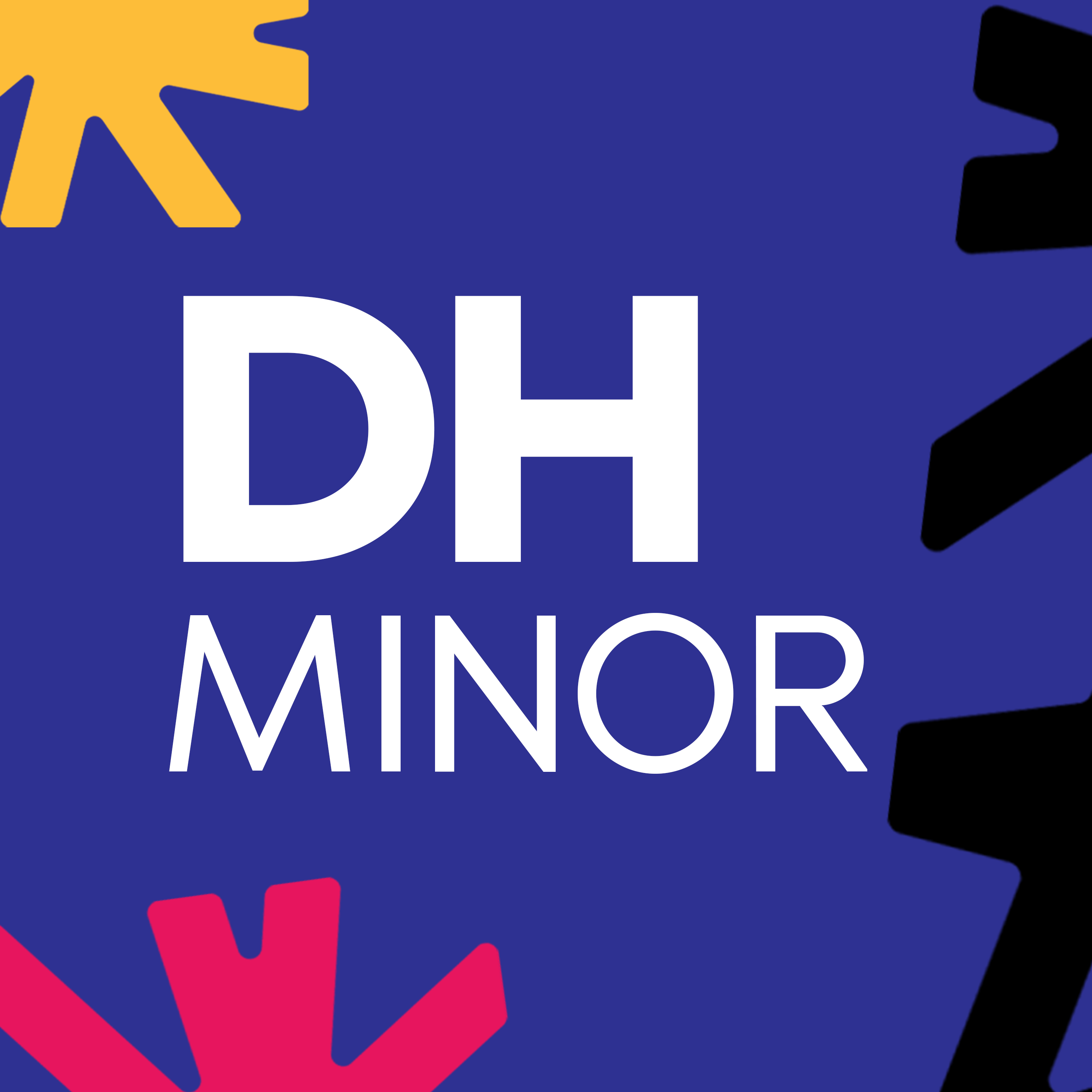Digital Humanities Undergraduate Minor
Digital Humanities Minor
ABOUT THE PROGRAM
The Undergraduate Minor in Digital Humanities is offered by the School of Arts and Sciences at the University of Pennsylvania. It has been designed for students who want to augment their disciplinary studies in the humanities or humanistic social sciences with advanced digital research techniques and in-depth engagement with theoretical, political, and practical questions raised by digital technologies. Students from outside the humanities are also welcome to enroll in the DH minor, e.g. to add a humanities dimension to a mostly science-and-tech curriculum.
“Digital Humanities” is more of an umbrella term for a diverse range of scholarly practices than a stable, coherent field. The minor in digital humanities reflects that diversity by bringing together coursework from across the university and by allowing for multiple pathways through the program. It is a very flexible minor that draws on faculty from many departments of the School of Arts and Sciences as well as other schools of the University and encourages students to enroll in courses outside of their major. Students minoring in digital humanities will have the opportunity to learn valuable programing and data management skills, to explore topics such as digital text analysis, digital mapping, 3D modeling, and the use of digital tools for collecting, organizing and studying material culture. Course work will also expose students to debates about the social effects of digital technologies and require them to attend lectures, workshops and other relevant events at Penn and around Philadelphia.
PURPOSE
Once a small corner of the humanities, Digital Humanities has exerted a notable influence on literary studies, history, cultural studies, archaeology and anthropology, and has radically changed the way that many scholars conduct research and share work. As humanities fields evolve to incorporate digital tools and methods, an increasing number of scholars are finding it necessary to expand their digital understanding. While students may be able to learn specific tools and methods on their own or through their coursework, the purpose of the DH minor is to offer them a systematic program of study as well as an official credential to recognize their work and training. Students who successfully complete the requirements of the minor will develop the insight to be both thoughtful users of technology and sophisticated critics of digital work.
STRUCTURE
The Digital Humanities Minor will take 6 courses total and the sequence has been designed to guide students through three tiers of courses that begin very broad and then narrow in focus.
The first tier is the broadest and is intended to make sure students understand the basics of Digital Humanities. There are two required courses in Tier 1: Introduction to Digital Humanities (ENGL 1650) and one qualifying introduction to programming course. The School of Arts and Sciences regularly offers Data Science for the Humanities (ENGL 1670), which has been designed to fulfill the programming requirement. However, students may also count one of the introduction to programming courses offered by Engineering (such as CIS 1100). Skills and context learned in these courses will be used and built upon in subsequent courses.
In the second tier, students will choose at least one but not more than three classes that will help them focus on specific methodologies. The assumption is that students will want to dive a bit deeper into those specific trajectories within digital humanities that are most applicable to their own research interests. Courses in this tier will allow them to gain practical skills in a hands-on, project based environment.
While the first two tiers are focused on skill building, the third tier of courses gives students opportunities to use the skills they have learned to conduct original research. Students will take at least one but no more than three Tier 3 courses. Courses with significant digital content will be pre-approved for the minor. However, students may also work with their instructors to develop alternative digital projects or even independent studies. The goal at this level is for students to practice integrating digital humanities practice into academic work in non-trivial and critical ways.
BENEFITS
The Digital Humanities Minor has been designed to enhance the research profile of participating students and to give them the skills needed to participate more effectively in contemporary disciplinary and interdisciplinary scholarly debates. Furthermore, participation in the minor will help students develop valuable skills that may be utilized in a variety of professional settings both in and out of academia.
COURSES OFFERED SPRING 2026
TIER 1:
ENGL 1670: Data Science for the Humanities
This course will provide you with a practical introduction to data-driven inquiry in the humanities, with a focus on statistical analysis in the Python programming language. (No prior knowledge of programming is required or expected). See the English Department's website at www.english.upenn.edu for a description of the current offerings.
TIER 2:
CIMS 2550: Intro to Media Production
This course is the foundation for many upper-level courses across media production. It will introduce students to the basic skills of camerawork, video editing, sound recording, sound design, and color correction. Students will have the opportunity to work in narrative, experimental, and multimodal (academic) modes of media creation. Assignments will include making short narrative, documentary and other media. After this course, students will be prepared for upper-level courses in cinematography, editing, motion picture production, experimental media and digital humanities.
PSCI 1800: Introduction to Data Science
Understanding and interpreting large datasets is increasingly central in political and social science. From polling, to policing, to economic inequality, to international trade, knowing how to work with data will allow you to shed light on a wide variety of substantive topics. This is a first course in a 4-course sequence that teaches students how to work with and analyze data. This class focuses on data acquisition, management, and visualization, the core skills needed to do data science. Leaving this course, students will be able to acquire, input, format, analyze, and visualize various types of political and social science data using the statistical programming language R. While no background in statistics or political science is required, students are expected to be generally familiar with contemporary computing environments (e.g. know how to use a computer) and have a willingness to learn a variety of data science tools. Leaving this class, students will be prepared to deepen their R skills in PSCI 3800, and then use their R skills to learn statistics in PSCI 1801 and 3801. They will also be ready to use their R skills in courses in other disciplines as well.
TIER 3:
CIMS 2665: Fakes, Forgeries and Forensics in Digital Media
Fake images on social media are just one of the latest examples of fabrications and modifications that have taken media into dubious territory throughout history. This course will analyze the history of fakes and forgeries and consider whether they devalue the original or not, or even have value in themselves. Along the way, students will learn how fakes and forgeries have been created, what tools can be used to counter the onslaught of illicit creations, and the arts and humanities debates that have arisen surrounding them. After evaluating the ways various media have been modified over time, this course will show students how to use photo manipulation tools to modify digital media. It will also show students how to perform various detailed analyses of digital media to determine their legitimacy. A final project will bring these tools together, as groups of students create a fake or forgery, consider its implications and evaluate a tool’s ability to detect it.
ANTH 2701: Indigenous Media
This course introduces students to the active participation of Indigenous peoples across the globe in media technologies and the creation of media objects. We will critically explore how Indigenous peoples have engaged with media technologies—both adapting Western technologies and developing distinctive practices—to express their identities, contest stereotypes and systemic erasure, and grapple and expose pressing issues affecting their communities. This course starts by analyzing how Indigenous peoples have been represented in Euro-American media and considering the effects of these portrayals. Building upon this foundation, we will examine how Indigenous groups have used film, radio, and digital technologies to create their own modes of storytelling and self-representation. In the second half of the course, we will explore the complex relationships that have emerged with the rise of digital technologies. We will consider how Indigenous groups interpret and respond to the roles of these technologies in their communities. Importantly, we will examine how Indigenous peoples are not only users but active producers of digital technology—for example, by looking at a Diné reservation labor site involved in semiconductor manufacturing. Throughout these discussions, we will grapple with the ethical issues that arise from these technologies and their effects among Indigenous communities. Through close analysis of case studies, media artifacts, theoretical readings, and guest speakers, students will explore how media objects are not neutral or autonomous, but rather shaped by local ways of knowing, by the possibilities and limitations of technologies, and by the goals and values of societies. We will challenge the idea that media technologies are automatically good or empowering. Instead, we will examine technology as “ambivalent”—capable of helping, hindering, and creating unexpected outcomes. Students will grapple with the diversity of Indigenous groups and how differing groups go about media usage. While there are more than 5,000 distinct Indigenous groups across the world, this course will primarily focus on media participation emerging from the Americas and Aboriginal and Torres Strait Islander peoples. Students will gain critical skills in media analysis and thoughtfully engage with issues of media, technology, and Indigeneity.
ARTH 3070: The Rise of Image Culture: History and Theories
Today images are everywhere; two centuries ago, they were rare. This seminar considers key historical and theoretical contexts for this change and its social consequences. With the help of some of the strongest critics and theorists of image culture, we will consider five interrelated aspects of the rise of image culture. - First, we will explore how new media and mechanical reproduction has changed the idea of the image over in the free market. - Second, we will explore how images operate through the psyche and gaze and how that operation is tied to social and political power. - Third, we will examine how representations make meaning and form identity in coded systems. - Fourth, we will consider the relationship between visual space and concepts of reality. And finally, we will interrogate how the physical and digital material that images are made from affects their meaning.
The Digital Humanities Minor is directed by Stewart Varner in consultation with the Executive Committee of the Price Lab for Digital Humanities. Dr. Varner will also serve as the designated advisor for students interested in the program as well as those who have declared it. Please contact us to declare the DH Minor.
More information in the Penn Undergraduate Catalog and College of Arts and Sciences.





